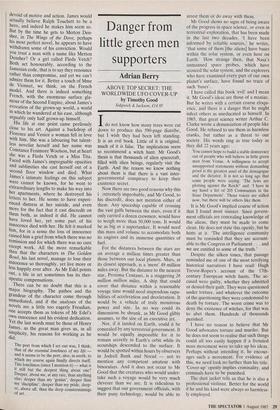Danger from little green men supporters
Adrian Berry
ABOVE TOP SECRET: THE WORLDWIDE UFO COVER-UP by Timothy Good
Sidgwick & Jackson, £14.95
Ido not know how many trees were cut down to produce this 590-page diatribe, but I wish they had been left standing. It is an evil book. Little of it is original, much of it is false. The implications seem to recommend a witch hunt. Mr Good's thesis is that thousands of alien spacecraft, filled with alien beings, regularly visit the Earth. And the reason we know nothing about them is that there is a vast inter- governmental conspiracy to keep their existence secret.
Now there are two good reasons why this i extremely improbable, and Mr Good, to his discredit, does not mention either of them. Any spaceship capable of crossing the vast gulfs between the stars, even if it only carried a dozen crewmen, would have to weigh more than 50,000 tons. It would be as big as a supertanker. It would need this mass and volume to accomodate both its engines and its immense quantities of fuel.
For the distances between the stars are on average a million times greater than those between our local planets. Mars, at its closest approach, is a 'mere' 49 million miles away. But the distance to the nearest star, Proxima Centauri, is a staggering 26 million million miles. A ship that could cover that distance within a reasonable voyage time would need stupendous capa- bilities of acceleration and deceleration. It would be a vehicle of truly monstrous power and size. In no way could its dimensions be shrunk, as Mr Good glibly assumes, to the size of an executive jet.
Nor, if it landed on Earth, could it be concealed by any terrestrial government. It would be equally impossible for it to remain secretly in Earth's orbit while its scoutships descended to the surface. It would be spotted within hours by observers in Jodrell Bank and Norad — not to mention any competent amateur with binoculars. And it does not occur to Mr Good that the creatures who would under- take such a voyage would be very much cleverer than we are. It is ridiculous to suggest that our government officials, with their puny technology, would be able to arrest them or do away with them.
Mr Good shows no signs of being aware of the progress in space science, or even in terrestrial exploration, that has been made in the last two decades. 'I have been informed by reliable sources,' he writes, `that some of them [the aliens] have bases within the solar system, or even here on Earth.' How strange then, that Nasa's unmanned space probes, which have scoured the solar system, and the explorers who have examined every part of our own planet's surface, have found no trace of such 'bases'.
I have called this book 'evil' and I mean it. Mr Good's ideas are those of a maniac. But he writes with a certain coarse eloqu- ence, and there is a danger that he might infect others as uneducated as himself. In 1965, that great science writer Arthur C. Clarke wrote a denunciation of people like Good. He refused to see them as harmless cranks, but rather as a threat to our society. His words ring as true today as they did 22 years ago: You cannot hope to build a stable democracy out of people who will believe in little green men from Venus. A willingness to accept unsupported statements without demanding proof is the greatest asset of the demagogue and the dictator. It is not so long ago that some people were saying: 'The Jews are plotting against the Reich!' and: 'I have in my hand a list of 205 Communists in the State Deparment'. Those voices are stilled now, but there will be others like them.
It is Mr Good's implied course of action that I found most sinister. Since govern- ment officials are concealing knowledge of the aliens, they must be made to come clean. He does not state this openly, but he hints at it. 'The intelligence community must be reminded that they are account- able to the Congress or Parliament . . . and we are entitled to some of the truth.'
Despite the silken tones, that passage reminded me of one of the most terrifying historical narratives I have read: Hugh Trevor-Roper's account of the 17th- century European witch hunts. The ac- cused were guilty, whether they admitted or denied their guilt. They were questioned under torture, and whatever the outcome of the questioning they were condemned to death by torture. The worst crime was to deny the existence of witches, for that was to abet them. Hundreds of thousands perished.
I have no reason to believe that Mr Good advocates torture and murder. But he does not seem to realise that such things could all too easily happen if a frenzied mass movement were to take up his ideas.
Perhaps without intending it, he encour- ages such a movement. For evidence of this, we need look no further than his title. `Cover-up' openly implies criminality, and criminals have to be punished.
The dust jacket tells us that he is also a professional violinist. Better for the world if he and his kind were always so harmless- ly employed.


















































 Previous page
Previous page